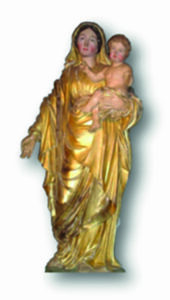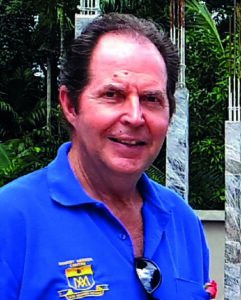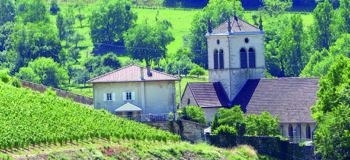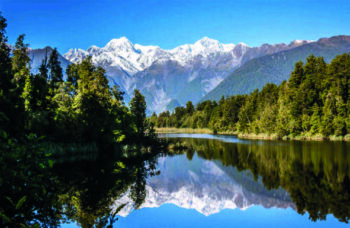Something Old – Something New [1]
Part 7 of 8
A Possible Marist Spiritual Ecology
The third Dimension:
Tasting God – Cerdon
The Marist Story within the Universal Story
We are proposing a paradigm for re-energizing our Marist Story by reconnecting it with the Universal Story
The Marist Story can be seen as having four foundational dimensions:
Call – Le Puy;
Commitment – Fourvière;
Tasting God – Cerdon;
and Mission – Bugey and Oceania.
These four Dimensions are Universal experiences. We can empower each of these dimensions with a new lease of life by connecting them to relevant passages of Pope Francis' Laudato Si. This article focuses on the Dimension of Tasting God.
A third dimension of a Marist Vocation is Cerdon, where Jean-Claude Colin received consolation and conviction from God in regard to the Marist Project. Fr Jean Coste has this to say:
It was at Cerdon, from 1816-1822, that events took place that were to be decisive for the future of the Society as a whole. [2]
And Fr Colin said,
Over a period of six years, I experienced extraordinary serenity when thinking about the Society, with a clear feeling that it was the work of God. I experienced tangible comfort just at the thought of it. When I heard a piece of news, I glowed all over, my face became radiant. But I bless God... He really cured me… there were trials... [3]
The Society of Mary Constitutions tell us that Cerdon was a foundational Marist experience [# 51]. It was here, at Cerdon, in prayer and meditation on the mystery of Mary’s presence in the Church, that Fr Colin became convinced that the ideas of the Society of Mary came from God [# 53]. Nothing will be as effective as a reliving of the founding experience of the Society…. by ‘tasting God’ as Colin did at Cerdon - through this we come to know the joy that comes from a whole-hearted response to our vocation [# 92].
These years in Cerdon were also communal, as well as being personal for Fr Colin. His brother Pierre was also part of the project. Jean-Marie Chavoin, who was to become the Foundress of the Marist Sisters, was their housekeeper, and came to know Colin’s mind at real depth. They prayed, wrote, planned, and talked about the Society of Mary as a tree of many branches. Colin himself, while drafting the Constitutions during these years, underwent a profound transformation:
• from moral rigorist at ordination, to a sympathetic and compassionate pastor;
• from being unable to move a foot without a director, to learning to walk by himself;
• from being cold and lifeless, to being a vigorous preacher.
Colin himself said this was all Grace, preparing him for the trials of the years to come. [4] His ‘tasting God’ led to the transformation of his personality, he was able to pursue and establish the dream to which God was calling him.
These consolations of God – Colin, Ignatius, and Pope Francis assure us – are the experiences with nourish and sustain us, and to which we must return when we encounter desolation.
They enable us to pursue and establish that part of God’s dream for which you and I are responsible.
While few of us will have had the opportunity to visit Cerdon, let alone live there, we are all generously offered the perennial “Cerdon experience” of ‘tasting God’ of which the Psalmist speaks and which is available to us in contemplating the Mystery behind the mysteries of our created world and universe. Here are some texts from Pope Francis, in Laudato Sì, inviting us to ‘taste God’:
# 12 Rather than a problem to be solved, the world is a joyful mystery to be contemplated with gladness and praise
# 18 Today’s more intensified pace of life might be called rapidifcation – this contrasts with the naturally slow pace of biological evolution
# 20 Technology, which, linked to business interests, proves incapable of seeing the mysterious network of relations between things
# 22 It is hard for us to accept that the way natural ecosystems work is exemplary:
– # 42 Because all creatures are connected, each must be cherished with love and respect
– # 65 Every person is created out of love, in God’s image and likeness – with immense dignity
# 66 St Bonaventure held that, through universal reconciliation with every creature, St Francis in some way returned to the state of original innocence
# 69 Other living beings have a value of their own in God’s eyes: by their mere existence they bless him and give him glory. Each of the various creatures, willed in its own being, reflects in its own way a ray of God’s infinite wisdom and goodness
# 73 The God who liberates and saves is the same God who created the universe, and these two divine ways of acting are intimately and inseparably connected
# 84 Soil, water, mountains: everything is, as it were, a caress of God. We all remember places, and revisiting those memories does us much good -- going back to these places is a chance to recover something of our true selves
# 85 God has written a precious book, ‘whose letters are the multitude of created things present in the universe.’ Nature is a constant source of wonder and awe. It is also a continuing revelation of the divine. To sense each creature singing the hymn of its existence is to live joyfully in God’s love and hope. There is a divine manifestation in the blaze of the sun and the fall of night
# 86 God’s goodness ‘could not be represented fittingly by any one creature.’ Hence, we need to grasp the variety of things in their multiple relationships
# 88 The Spirit of life dwells in every living creature and calls us to enter into relationship with him – this presence calls us to cultivate the ‘ecological virtues’
For Reflection and Prayer
• As we ponder these texts, these ways of being called to ‘taste God,’ what memories do I have to thank God for in experiencing God’s Presence in creation?
• What am I truly grateful for in the created world?
• What do I need to care for, preserve, and ensure a future for those coming after us – so that they, in their turn can ‘taste God’ [5] in the wonder of God’s created mysteries?
____________________________________________________
[1] Matthew 13:52 – “Every scribe who has become a disciple of the kingdom of heaven is like a head of a household, … who brings out of his treasure things new and old.”
[2] Jean Coste SM, Lectures on Society of Mary History, Rome, 1965, p. 39
[3] Craig Larkin SM, A Certain Way, Rome, Centre for Marist Studies, 1995, p. 28
[4] Coste, op.cit. pp 42-44
[5]Psalm 34:8 “Taste and see that God is good. Happy is the one who takes refuge in God.”




 Entries(RSS)
Entries(RSS)